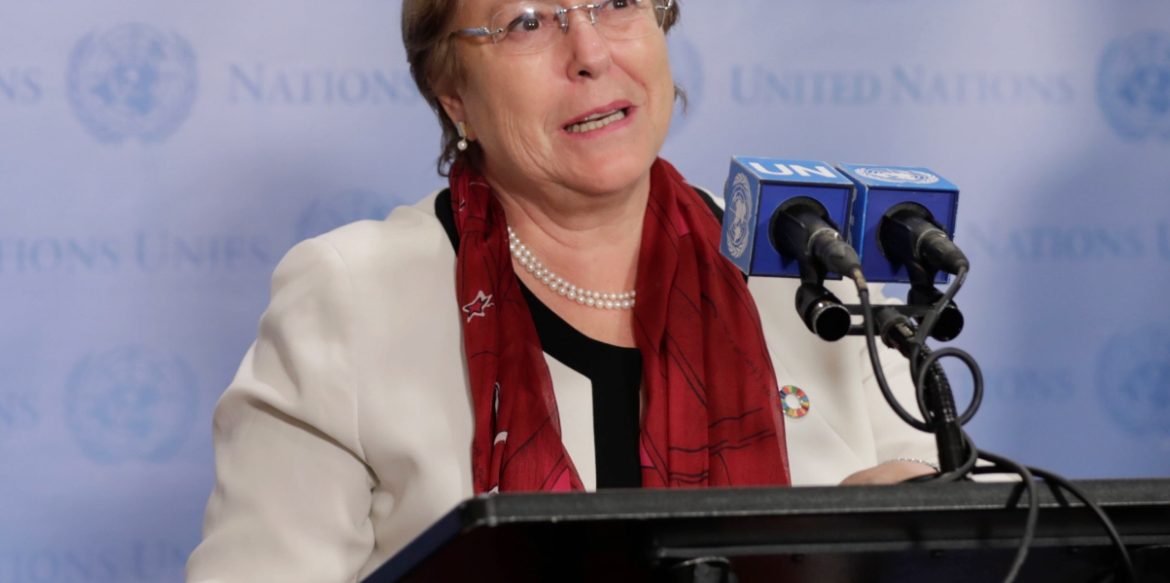The United Nations High Commissioner for Human Rights must address crimes against humanity and gross human rights violations when her team visits China’s Xinjiang Uyghur Autonomous Region this week, Amnesty International said today as the UN’s long-awaited trip got under way.
A team led by High Commissioner Michelle Bachelet will spend six days in China including Xinjiang, where Amnesty International has documented systematic arbitrary imprisonment, torture and persecution of Uyghurs, Kazakhs and other predominantly Muslim ethnic minorities.
“Michelle Bachelet’s long-delayed visit to Xinjiang is a critical opportunity to address human rights violations in the region, but it will also be a running battle against Chinese government efforts to cover up the truth. The UN must take steps to mitigate against this and resist being used to support blatant propaganda,” said Agnes Callamard, Amnesty International’s Secretary General.
“Lasting six days, this visit will only be able to scratch the surface of addressing crimes against humanity in Xinjiang. But at the very least Bachelet’s visit must focus on the victims of China’s crackdown: the Uyghurs and other Muslims who have been targeted and the many families overseas who are tormented by not knowing where their relatives are held and how to pursue justice, truth and reparation.”
Amnesty International and other human rights groups have repeatedly called on the Chinese authorities to allow independent UN human rights experts and other human rights monitors access to Xinjiang – a demand that is finally being granted with this brief visit by the Office of the High Commissioner for Human Rights (OHCHR).
The UN must avoid becoming complicit
The High Commissioner committed to speaking to key stakeholders prior to her visit. However, the UN team faces a serious challenge to ensure this visit meets their stated standard of being truly “unfettered”, “meaningful” and “including unsupervised interviews”.
“Bachelet will be aware of repeated steps taken by the Chinese authorities during previous visits by UN human rights envoys to impose strict surveillance and undermine access, including by detaining identified interviewees and potential interlocutors and warning others to feign absence.”
Amnesty International has also documented instances of detainees from minority groups in Xinjiang being coached for days in preparation for foreign visitors, instructed to respond to visitors’ questions with pre-scripted lines on threat of punishment.
“The OHCHR must avoid becoming complicit in the Chinese government’s attempts to cover up human rights violations, potentially by using the visit itself as ‘proof’ of their falsity,” Callamard said.
“The itinerary of the visit should not be imposed by the Chinese authorities but guided by the mandate of the visit and grounded on human rights methodology, including by being victim-centered. Above all, Bachelet’s team must be able to conduct an impartial assessment of the situation on the ground and be fully transparent about the details of the trip, the terms of their agreement with the government and its delivery on the ground.”
Since September 2018, when the High Commissioner first sought access to Xinjiang “in light of deeply disturbing allegations of large-scale arbitrary detentions of Uighurs and other Muslim communities”, numerous organizations have published further detailed and well-corroborated information on the situation. In June 2021, Amnesty International launched a comprehensive report documenting how China’s crackdown against predominantly Muslim ethnic minorities in Xinjiang amounted to crimes against humanity.
Based on dozens of testimonies, the report described a “dystopian hellscape” encompassing grave violations against detainees, systematic state surveillance of millions of people, and efforts to root out the religious traditions, cultural practices and local languages of the region’s Muslim ethnic groups.
Amnesty International launched an international campaign, initially focusing on more than 70 individuals, calling for the release of all people arbitrarily detained in camps and prisons, and for the closure of the internment camps. Just this month Amnesty has collected details of a further 40 missing or detained individuals as news of Bachelet’s visit has prompted more families to come forward seeking justice for relatives in Xinjiang who have disappeared and are believed to be detained.
Bachelet’s visit is also a chance to secure a long-lasting communication channel between the OHCHR and the local authorities with regards to future queries from families about the fate and whereabouts of their loved ones.
“Hundreds of thousands of Chinese Uyghurs and other Muslim minorities are looking to Bachelet’s team to start the process of holding China to account over its campaign of terror in Xinjiang,” Callamard said.
“This UN visit must amplify victims’ efforts to track down their loved ones by actively seeking out known detainees and leaving no stone unturned in trying to find them. It must contribute to uncovering the truth that the Chinese government has long been trying to hide.”
Calls to release OHCHR report
The OHCHR has already compiled its own report on human rights violations in Xinjiang, which Bachelet said was being “finalised” last year. It has not yet been made public, despite repeated requests from Amnesty International and almost 200 other NGOs.
“It is crucial that the findings of the UN mission to China are released in a timely manner. Their publication must not suffer the same unexplained delays as the OHCHR report on Xinjiang, which the world is still waiting to see. The OHCHR must make public all its findings about human rights violations in China without further delay,” Callamard said.






















